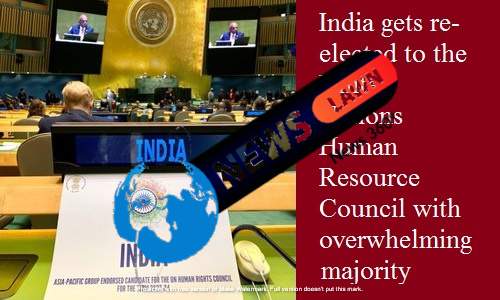India gets elected to the United Nations Human Rights Council (UNHRC) for the term 2022-24. India got an overwhelming majority of 184 votes on Thursday in the 193 member UN General assembly.
On Thursday, the 76th UN General Assembly held elections for the 18 members of the UN Human Rights Council. India will now serve for a period of 3 years starting in January 2022. India has been elected consecutively for the second time. India’s current term was set to end on December 31 2021.
Also, Read | Abdulla Shahid Elected As President Of UN General Assembly
The required majority was only 97. But gained a big margin of 184 to get elected. After the elections, India’s Permanent Representative to the UN Ambassador TS Tirumurti stated –
I am truly delighted at this overwhelming support for India in elections to Human Rights Council. It’s a robust endorsement of our strong roots in democracy, pluralism and fundamental rights enshrined in our Constitution. We thank all UN Member States for giving us a strong mandate,
India’s Permanent Mission to the UN tweeted –
India🇮🇳 gets re-elected to the @UN_HRC (2022-24) for a 6th term with overwhelming majority.
Heartfelt gratitude to the @UN membership for reposing its faith in 🇮🇳.
We will continue to work for promotion and protection of Human Rights through #Samman #Samvad #Sahyog pic.twitter.com/ltqktWcat1
— India at UN, NY (@IndiaUNNewYork) October 14, 2021
The UN said –
This broad membership not only reflects the UN’s diversity, but it gives the Council legitimacy when speaking out on human rights violations in all countries,
There were five vacant seats in the Asia-Pacific States category – India, Kazakhstan, Malaysia, Qatar and the United Arab Emirates.
18 new members of the UN Human Rights Council are – Argentina, Benin, Cameroon, Eritrea, Finland, Gambia, Honduras, India, Kazakhstan, Lithuania, Luxembourg, Malaysia, Montenegro, Paraguay, Qatar, Somalia, UAE and the USA.
As a whole, the Human Rights Council consists of 47 Member States elected directly and individually by secret ballot. The membership is based on the equitable geographical distribution among regional groups of African States (13), Group of Asia-Pacific States (13), Group of Eastern European States (6), Group of Latin American and Caribbean States (8) and Group of Western European and other States (7).

